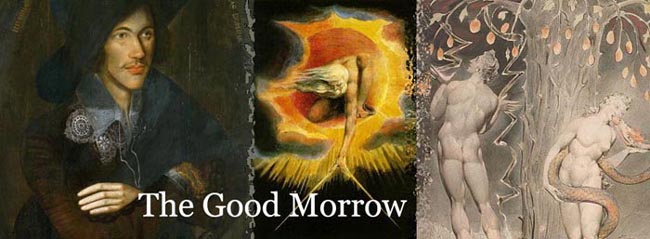Need Help on Donne's Famous Poem?
 Monday, October 29, 2012 at 09:27PM
Monday, October 29, 2012 at 09:27PM When I named this Blog The Good-Morrow, I had absolutely no idea that hundreds of students and school pupils from all over the world would find themselves unwitting visitors, simply because they had typed The Good-Morrow into a search engine. So if you are one of those visitors, I have done my very best to reduce your disappointment and actually help you out. So if you came looking for help in understanding or writing about Donne’s poem, a good way to start is to listen to the poem and then please read on.

Donne was fascinated by love and his work includes a rich selection of highly intelligent, complex love poems and The Good-Morrow is one that has often landed up in poetry anthologies. In some ways it is a very conventional love poem because, once you’ve read it, I’m sure you will realize that it is set at dawn, after a night of making love. This kind of poem is called an Aubade, a term used in poetry and music for the drowsy bliss of a post-coital dawn. You might well have come across another famous aubade in your English Literature studies without even knowing it. The little chat Romeo and Juliet share about nightingales and larks after their only night together is…an aubade. Shakespeare had no stage lighting and talk about larks, an early bird if ever there was one, is his way of telling the audience it is now day. Donne doesn’t tell us it’s dawn until verse two of his poem, And now good morrow to our waking soules, where the last word seems to embrace both their physical bodies and their unique, psychological selves.
The lovely image which opens verse three, of their seeing each other’s reflections in their eyes, suggests not just physical, but emotional intimacy too. Casual sex was not a phrase you would have heard in Donne’s courtly, religious world, and it is important you realize these two are in love.
When Donne wrote about love, although he does explore the sensual pleasures and sensations, he is much more fascinated by the effect love has on his mind than anything else, and that is definitely true of this poem. If you look at verse one for example, and work out for yourself what the list of rhetorical questions he asks leads up to, you should find it is that very familiar sensation to young lovers, the feeling that somehow everything that took place before this event was in some profound way meaningless or only fragmentary, a little bit of a jigsaw that until this moment of completion, you never even knew you were building.
He also uses the very conventional love poem tactic of eulogising, or praising his lover. Beautiful women he may formerly have desired, and enjoyed, become just dreams in comparison to the girl in this bed, here and now, this morning.
If ever any beauty I did see,
Which I desir’d, and got, t’was but a dreame of thee.
At first glance this seems quite a simple, straightforward compliment, but Donne is one of the most sophisticated, difficult and demanding poets in the entire history of English poetry and if you interrogate it a little more fully, it proves very revealing. We use phrases like ‘the girl of our dreams’ or ‘I must be dreaming’ routinely when the pleasures become so intense they seem to outstrip reality, but here, Donne says this girl is so superb that the real experiences of having loved other women, have all now become just dreams of her. Put yourself in her shoes for a moment. What an amazing compliment. For Donne, hyperbole is an instinctive gift. There are many examples in his poetry where you can think of a way of exaggerating something, and he will inevitably go one step further.
You may also have noticed that there is no dialogue, no speech in this poem. Yet the girl is there, it is morning and they are both very conscious of what has just taken place between them. Donne recreates for us a stage in their developing love, the moment when he realises how significant this event is and conveys that knowledge to his lover. It really is a new dawn, a ‘good-morrow.’
I hope that has been some help and if you are studying Donne in detail, and not just this one poem, you might like to take a look at the My Books section of this blog, or even post a comment or question here. Or visit my Facebook Page.
 Joe Nutt |
Joe Nutt |  29 Comments |
29 Comments | 

